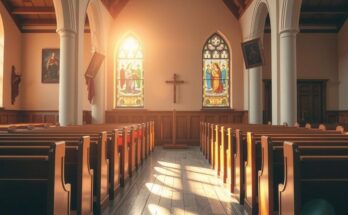Filipino Bishops have endorsed the arrest of former President Duterte on charges of crimes against humanity, viewing it as a critical advance towards accountability regarding human rights violations. His apprehension followed an ICC warrant linked to numerous extrajudicial killings during his tenure, with various church leaders and human rights organizations highlighting the need for justice and reparations for victims.
Bishops in the Philippines have expressed approval of the recent arrest of former President Rodrigo Duterte on crimes against humanity charges, viewing it as a significant step towards accountability and a precedent for addressing human rights violations in the nation. Duterte, who led the country from 2016 to 2022, was apprehended at Manila airport following an ICC warrant linked to his violent “war on drugs”. His extradition to The Hague occurred shortly after he arrived there on March 12.
Duterte has faced numerous accusations related to extrajudicial killings, particularly targeting young men from impoverished communities. Official police records report over 6,200 extrajudicial killings; however, independent organizations suggest that the actual figures could range from 12,000 to 30,000 deaths, many occurring in suspicious circumstances. The ICC investigation spans from 2011 to 2019, including the period when Duterte was mayor of Davao, solidifying the longstanding power of his family in the region.
Duterte’s forced extradition has garnered widespread support from the Catholic Church, human rights advocates, and victims’ families, although some of his supporters view the arrest as persecution. Bishop Gerardo Alminaza of Caritas Philippines emphasized that the killings during Duterte’s regime were not isolated events but a systematic policy that violated the fundamental right to life. Complaints at the ICC allege the existence of a “death squad” targeting drug suspects both in Davao and nationally.
Bishop Jose Colin Bagaforo highlighted the arrest as a vital move towards justice, stating, “True justice… is about accountability, transparency, and the protection of human dignity.” He further challenged Duterte to uphold his prior claims of accountability and readiness to face consequences, asserting, “Now is the time for him to prove it.”
The humanitarian arm of the Catholic Church has called for truth, reparations, and justice for the victims in their statement on March 11. They characterized Duterte’s arrest as a pivotal moment for the Philippines, encouraging the populace to prevent recurrence of such crimes and to uphold the rule of law. Throughout Duterte’s presidency, the Church has consistently condemned the brutal enforcement of the drug crackdown.
Bishop Broderick Pabillo of Taytay remarked that while the arrest does not imply guilt, the crimes under Duterte’s administration necessitate investigation, asserting that “no one is above the law, and everyone must answer for their actions.” Human rights organizations such as Amnesty International and Human Rights Watch have echoed this sentiment, deeming the arrest a critical step towards accountability in the Philippines. Despite Duterte’s claims that the ICC lacked jurisdiction, activist Aaron Pedrosa noted that the ICC maintains jurisdiction over crimes committed prior to a nation’s withdrawal, as stipulated by the Rome Statute.
In summary, the arrest of former President Rodrigo Duterte serves as a pivotal moment in addressing human rights violations in the Philippines. The support from Catholic bishops and human rights organizations reflects a collective demand for accountability, justice, and the safeguarding of human dignity. As the public and advocacy groups call for thorough investigations into the extrajudicial killings that occurred during Duterte’s administration, the path towards accountability appears to be more attainable than before.
Original Source: www.vaticannews.va




